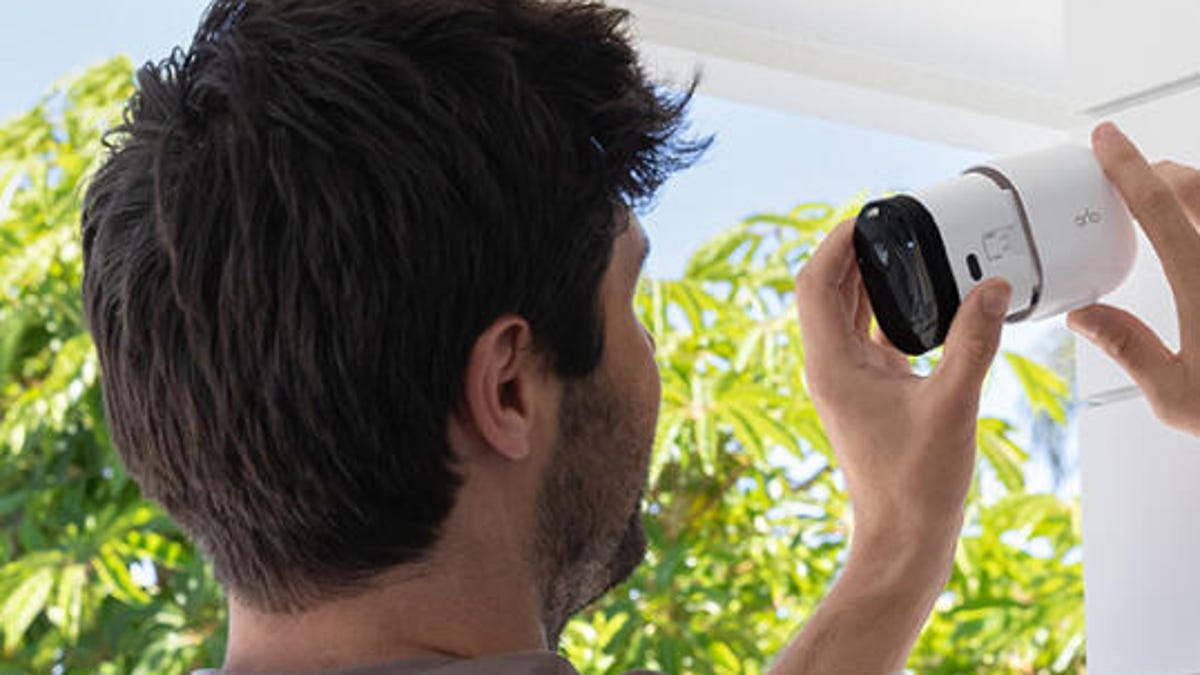
The Blink Outdoor 4 has an adjustable mount that’s sturdy enough to stay at the right angle.
How you power the camera
Outdoor cameras need reliable power. Some users have no problems recharging a battery every several months. Others may want to place cameras in positions where regular recharging is difficult. Wired versions of cameras skip this step but often require existing wiring or electrical work. Then there’s PoE, or Power over Ethernet, which supplies both an internet connection and power at the same time but requires a dedicated Ethernet line. These days, we’re also seeing a growing number of solar outdoor cameras that offer a charging alternative.
All those choices come down to ease of use: We’re looking for cams with reliable power options, excellent battery life, usable solar panels and other home-friendly aspects. The higher the camera is placed and the more power it uses, the more a wired solution becomes important.
Durability
Outdoor cams must be weather-resistant, and high-quality versions should be able to handle low temperatures as well.
Video storage and security
What do outdoor cameras do with the video they capture? The two primary choices are cloud storage through an internet connection and local storage through a hub or microSD card. Cloud storage is easy to capture and share but usually needs a subscription and raises privacy concerns when police can request video footage directly from companies. Local storage is more private but much harder to manage when storage starts getting full and needs to be culled. Our list includes options for both, plus choices like the Nest Cam which offers cloud storage for free.
Video encryption is also important to help secure video transfer and access. At this point, we would bring up the latest protocols like Matter and Thread, designed to make smart devices safer and more compatible with different platforms. While this compatibility can help many smart devices, Matter doesn’t support video quite yet, so it won’t apply to most of your data management here.
Resolution and field of view
A security camera needs high-quality video and imaging to do its job well. The minimum these days is 1080p, and we’re seeing a growing number of 2K and even 4K home security cameras available for greater detail. Don’t go below HD-level if possible. Field of view, while less important, also helps a camera capture as large of an area as possible, which can be helpful when watching the entire front of a home or a whole backyard. About the best we’ve seen here is 160 degrees, but a 130-degree cam can still do well, especially if it’s easy to angle.
Motion detection and recognition
Motion detection both saves on video recordings and helps control adjacent features like spotlights and the important mobile alerts you can get on your phone. It’s typically an automatic feature but made immensely better when a camera has AI recognition capabilities (preferably for free). These help the camera ignore cars, leaves and possibly even animals in favor of humans, or let you choose alerts based on the subject matter. Together, the two features are a powerful mix.
Extra features like two-way audio
Two-way audio can prove helpful if it’s high-quality and the camera is close enough to people to be intelligible. Lighting is a very useful feature on any outdoor camera, which is why around half our list includes lighting of some kind (and all have night vision).